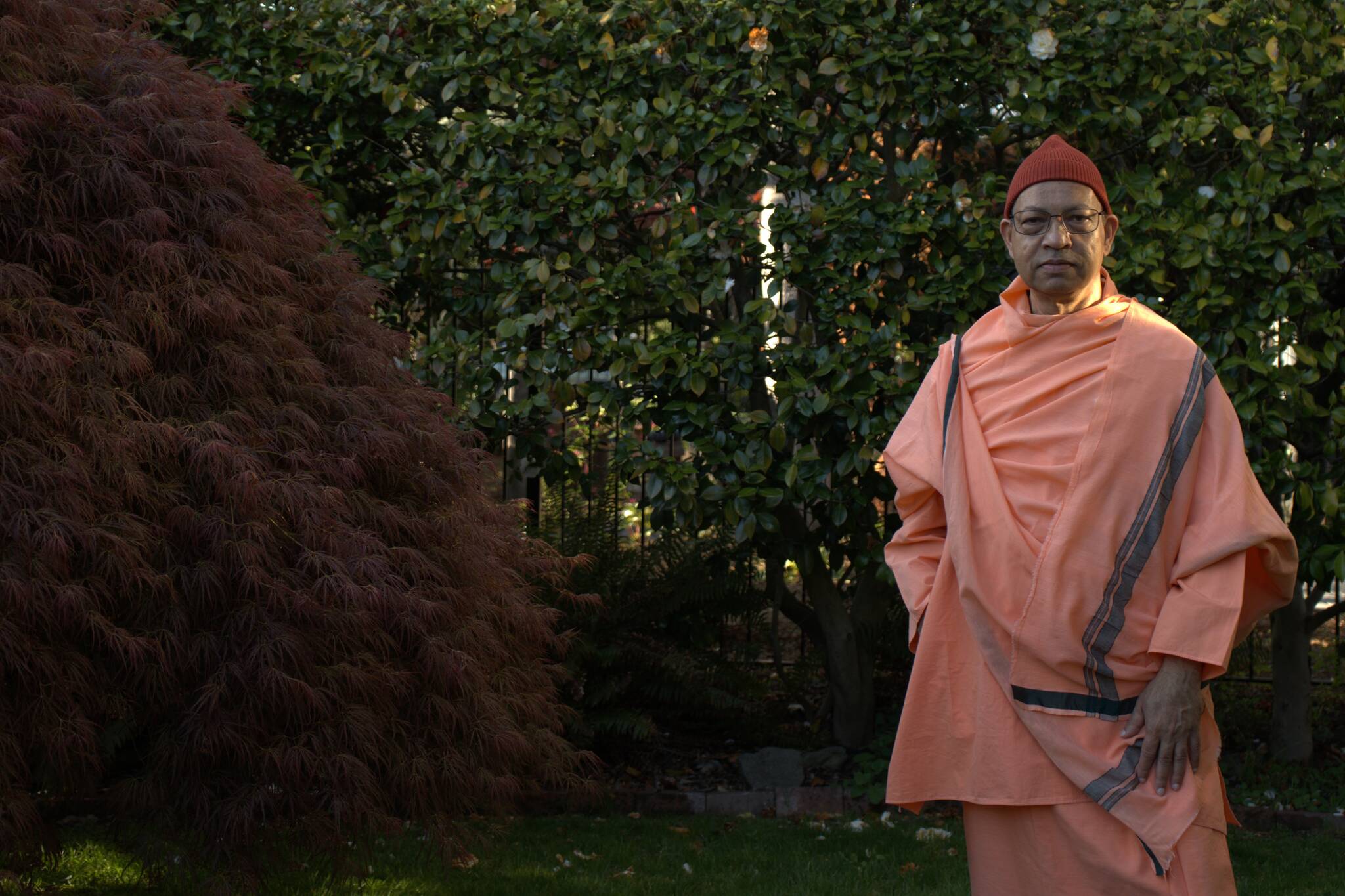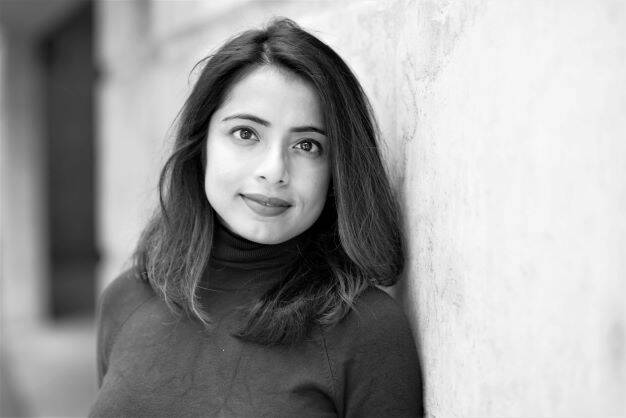The first monk to visit the shores of America, with the knowledge of yoga and Vedanta, was described by the New York Critic in 1893 as an “an interesting figure, [whose] fine, intelligent … face in its setting of yellows, and … deep, musical voice prepossess[ed] one at once in his favor.”
This large-eyed, young monk in saffron robes was Swami Vivekananda.
Monks tend to appear as solitary figures who thrive in silence, breathe slower, and view the rest of us with a blasé demeanor.
Early this year, I met an Indian monk in an old residential neighborhood of Seattle belonging to Swami Vivekananda’s Vedantic school of philosophy. An immigrant, much like me, Swami Satyamayananda presides over the Vedanta Society of Western Washington. The Vedas (from the word “vid,” meaning knowledge) are ancient Hindu texts containing hymns, rituals, philosophical enquiries, pharmacopoeia, and other forms of knowledge. The derivative — Vedantic/Vedantist — refers to a belief in oneness or sameness and the inherent divinity in all of us.
Put simply, it means you and I are the same entity — and we are all potentially divine.
This is reminiscent of an example from 1971’s “Conversation with Myself” — lectures by the English author and teacher of Buddhist studies, Alan Watts, who says, “Where there are no flowers there are no bees, and where there are no bees there are no flowers. They’re really one organism.”
On this note of sameness, I began my tête-à-tête with Swami Satyamayananda. Here’s an excerpt from our conversation:
Jay: Who is a Swami?
Swami S: The word “swami” comes from “swa” meaning “oneself,” plus “ami,” meaning “me.” A Swami is someone who is his own master. “Swami” also means a monk. Monks have always been there in Eastern societies. Even in the Dark ages, monks have been lamps of learning.
Jay: How would you describe your monastic life?
Swami S: A monk can live with oneself alone, in peace, in bliss. I am interested in learning — in different kinds of knowledge. My life is centered on meditation.
Jay: What is a monk’s purpose in life? What work do you do?
Swami S: The purpose of Vedanta preachers is to spread the knowledge of oneness. Monks from my order travel to share the spiritual knowledge documented in the Vedas. This is knowledge accumulated over thousands of years (approximately 5,000 years old), that surpasses sensory perishable knowledge, and delves in the imperishable knowledge of the Self/Atman.
Jay: Do you miss any aspects of pre-monastic life? What are these?
Swami S: Do you miss your toys when you grow up? I don’t miss anything. Because every life is an evolution. Every day you are evolving. Will a PhD scholar look back and say I want to go back to kindergarten?
Jay: There’s an apparent conflict in the idea of renunciation (symbolized by the figure of a monk like you) and consumerism (symbolized by capitalistic America). Do you see any clash between the thought process/lifestyle of a monk and that of capitalist America?
Swami S: There is no conflict. If you are spiritual, you’ll see the world as spiritual, not as a consumerist. If you are a consumer, you will look at the world through the lens of consumerism. You will find that your outlook dictates what you see. When I look at this world through the eyes of spirituality, all I see is people in need. Lonely, abused, fragmented, psychologically defenseless, people wanting to hold on to something. That said, consumerism exists because we’ve been producing so much and eating so much that we’ve become wanton. Monks like me want these people to look within, to study themselves, to come up with solutions to their own problems.
The human mind has become so externalized, it cannot think for itself nor see its own depths. There is a fragmented sense of the self — people don’t like what they see when they look in the mirror. To mask what they see, they run after intoxications. Consumerism is a result of being too externalized and that leads you to dissipate yourself. You’re stretched out too thin, and become vulnerable to external forces. We try to help people look within.
Jay: In a consumerist economy, where needs are both created and shaped by businesses and advertisers, how can an average person find contentment/happiness?
Swami S: You are the consumer. You give into the consumption. The question to ask yourself is whether you are comfortable with your own self. At the end of the day, you should be able to sleep with a mind that is at peace with itself. You’ll find happiness within yourself, not outside. For example, there are plenty of restaurants out there, with varied cuisines, but rather than relying on external satisfaction, try to learn how to cook a Thai/German dish and see the joy you get in it.
Jay: What does Hindu philosophy teach?
Swami S: If the fabric of a society is based on individualism, the society will self destruct. Sacrifice is central to human society and life. There’s a huge trend nowadays of people thinking in collective terms, so the individual cannot be the sole answer. Individualism is exploitative, it is the narrowing of the self. Think of the exploitation of environments, climate change — these are all byproducts of individualism. Hindu spiritualism preaches the abnegation of the ego/false self, and the realization of the true self. False self is nothing but “me and mine” — this leads to the destruction of social values. There’s always been a line of communication between an individual and the society. Your actions reflect on the society and the society gets reflected in you.
Jay: What is morality? What is its relation to “karma?”
Swami S: Morality is unselfishness. The more unselfish you are, the more moral you are. Karma comes from the root “kri,” which means “to do.” Every action (physical, mental, intellectual) you do is karma. It dictates everything in life — breathing, thinking, feeling … the whole world is bound by the laws of karma. The best way to escape your karmic debt is to become unselfish and thereby moral.
Jay: Humanity has always been intrigued by the concept of death. How would you define death?
Swami S: Death is nothing but a change of clothes. The soul sheds one body to take on a new body. There’s no fear in death. It’s a transition like going from one room to another. Hindus believe in the reincarnation of the soul. The soul has to come back continuously until it attains ultimate knowledge. In the West, death was demonized and feared as a result of the fatalistic one-life doctrine (though ancient Greeks like Plato believed in reincarnation).
Jay: What about heaven/hell/afterlife?
Swami S: Heaven and hell are kindergarten concepts based on duality. The definition of heaven changes with where you’re born, in which culture. The Scandinavians believed in Valhalla where slain warriors went; many Native Indian tribes had the concept of the spirit world; Christians and Muslims have different characterizations of these places.
Hindus have plenty of heavens like multiple gods, but these spaces are temporary base stations to stop and come back. Hinduism, Sikhism, Buddhism, Jainism, all believe in reincarnation. The ultimate goal of the soul is to attain knowledge. Even the ancient Greeks, like Plato and Plotinus, believed in reincarnation. The Emeritus of Psychiatry at Mount Sinai Medical Center, Dr. Brian Weiss, has written a phenomenal book on this subject called “Many Lives, Many Masters.”
Afterlife means your next life, not heaven. In this life everything you do leads to your next life. You leave with your karma and knowledge from this life, and take these into your next life. Your karma determines where you will be born. You see children who suddenly play the piano or violin very expertly, something that would’ve taken 30 to 40 years to master, but a five-year-old child plays it with equal deftness. Where does this come from? There are some born happy, some born in slums, some in penthouses — why this inequality? That is karma. The karma of the present life leads to the next life. And when you have attained moksha/liberation, you have burnt off all your karmic debts. Then you are free.
Jay: On Asian American and Pacific Islander Heritage Month, do you have any message for Asian American kids navigating their cultural identities — zero-gen immigrant parents raising them vs. a Western value system that may seem at loggerheads?
Swami S: Be true to your own self. Look beyond yourself to care for others. Take personal responsibility for what you say, do, and think. Asian values are family oriented. Be thankful to your parents, who struggled and worked hard to bring you here. Look after the needs of your parents. American society has a lot to learn from. You have the added advantage of learning from the best of both worlds, and blending these values. Why not look at it as the blending of the best of two worlds?
Jay: Do you have a message for the American youth? Anything the West can learn from the East in our present day and age?
Swami S: Learn to look beyond America, and see that the world is a very old place. Billions have come and gone before you … civilizations have risen and fallen. Learn to see history as a progression of human struggles and conquests. No one nation has determined human progress — recognize the richness of human knowledge systems around you. The East has a lot to learn from the West and West has a lot to learn from the East. This East/West polarity/duality is part of a discourse. We need to look beyond it through the lens of one humanity, seeking the best of values. Keep growing and looking beyond the American shores.
–
Dr. Jayendrina Singha Ray’s research interests include postcolonial studies, spatial literary studies, British literature, and rhetoric and composition. Prior to teaching in the U.S., she worked as an editor with Routledge and taught English at colleges in India. She is a resident of Kirkland, Washington.





